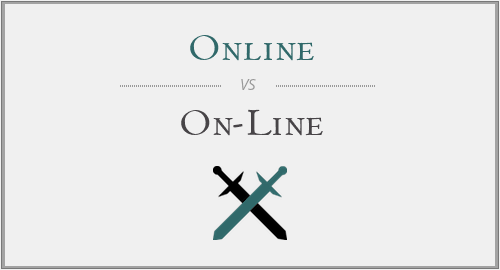Some words evolve – or change – over time. So what should you do when you have to choose between two words, meaning the same thing, written similarly, but different because they come from different time periods? Is it the older version that remains correct, is it the latest, or are they both correct?
This is the dilemma created by the words “online” and “on-line”. Both words have been used often in publications and communications. The difference lies in the time when they were used correctly. So, nowadays, which one is the correct form? Grammar.com is going to answer this question for you, with all the additional explanations you might need to clearly understand this.
Online vs. On-line
Both “online” and “on-line” are – or were, at one point – correct. But today, it is more probable that you see “online” written as one word, rather than “on-line” with a hyphen.
“On-line” is the original word, used in old English, mostly in the '90s, recommended for a stylish appearance and for an elegant vocabulary. Nowadays, however, most publications and dictionaries have accepted “online” as the unique correct form defining the active connection to the internet. Consequently, even though “on-line” is not necessarily considered a misspelling, “online” is certainly preferred in any English-speaking area. It’s shorter, easier to use and remember, and surely the recommended version for today’s English.

When do we use “online”?
Anytime. “Online” is the recommended word to use when referring to a connection to the internet. It is a common word and all English guides/dictionaries accept this form officially.
When do we use “on-line”?
Almost never today. Not that it would be wrong, but as mentioned above, “online” is far more commonly used and preferred by all official sources. The only situation when “on-line” is recommended is if you are trying to communicate in the old English style, maybe with a person used to the '90s English language who loved those times. Otherwise, just go for “online” to make sure you are correct.
Conclusion
While we couldn’t classify “on-line” as completely out of use or misspelled, “online” is certainly the form preferred nowadays. We certainly recommend you to use it as one word, without a hyphen, to make sure it won’t be identified as an error.




Have a discussion about this article with the community:
Report Comment
We're doing our best to make sure our content is useful, accurate and safe.
If by any chance you spot an inappropriate comment while navigating through our website please use this form to let us know, and we'll take care of it shortly.
Attachment
You need to be logged in to favorite.
Log In